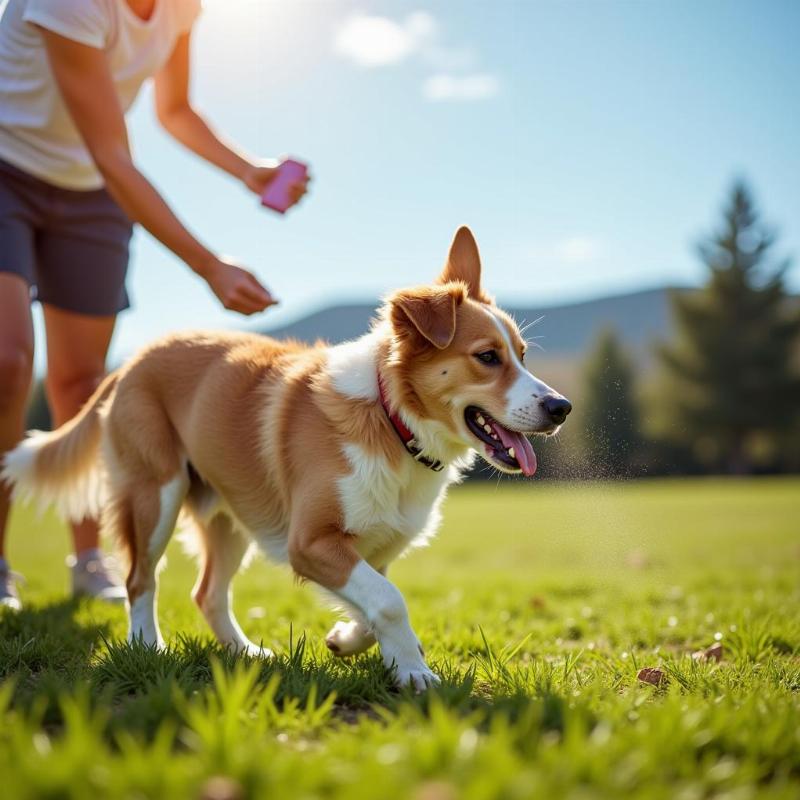Dehydration in dogs can have serious consequences, and many pet owners wonder if it can cause seizures. While dehydration itself doesn’t directly cause seizures, it can contribute to a cascade of health problems that may ultimately lead to them. Understanding this connection is crucial for providing the best care for your canine companion.
Understanding the Dehydration-Seizure Link in Dogs
Dehydration occurs when your dog loses more fluids than they take in. This fluid imbalance disrupts the delicate electrolyte balance in their bodies, affecting vital functions. While severe dehydration can trigger a range of serious health issues, seizures are often a secondary effect, not a direct consequence. Electrolyte imbalances, particularly low sodium levels (hyponatremia), which can be exacerbated by dehydration, can increase the risk of seizures. Similarly, a high body temperature (hyperthermia), often associated with dehydration, can also lead to seizures.
Recognizing Dehydration in Your Dog
Early detection of dehydration is essential. Look for these signs:
- Loss of skin elasticity: Gently pinch the skin on your dog’s back. If it springs back quickly, your dog is likely hydrated. If it takes a while to return to normal, they may be dehydrated.
- Dry gums: Healthy gums should be moist and pink. Dry or sticky gums can be a sign of dehydration.
- Sunken eyes: If your dog’s eyes appear sunken or dull, they may be dehydrated.
- Lethargy and weakness: Dehydration can sap your dog’s energy, making them seem tired and less responsive.
- Increased heart rate and panting: These are signs the body is trying to compensate for fluid loss.
What to Do if Your Dog is Dehydrated
If you suspect your dog is dehydrated, contact your veterinarian immediately. They can assess the severity of the dehydration and recommend the appropriate treatment, which might include intravenous fluids. Do not try to force-feed water to a severely dehydrated dog, as this can lead to aspiration pneumonia. [dog not eating in hot weather](https://beautdogs.us/dog-not-eating-in-hot weather/)
Preventing Dehydration in Dogs
Always ensure your dog has access to fresh, clean water. Encourage them to drink more water, especially during hot weather or after exercise. Consider carrying a portable water bowl and bottle when you’re out and about. dietz and watson beef hot dogs
 A dog playing fetch in sunny weather.
A dog playing fetch in sunny weather.
When Dehydration Leads to Seizures: What to Do
If your dehydrated dog has a seizure, seek immediate veterinary care. The vet will address both the dehydration and the underlying cause of the seizure.
Expert Insight
Dr. Emily Carter, DVM, a veterinarian specializing in canine neurology, states, “While dehydration itself doesn’t directly cause seizures, it creates a physiological stress that can lower the seizure threshold in predisposed dogs.”
She adds, “Recognizing the early signs of dehydration and taking prompt action is crucial for preventing serious complications, including potential seizures.”
Conclusion
Dehydration in dogs is a serious concern that can contribute to several health problems. While not a direct cause, dehydration can create an environment where seizures are more likely to occur, especially in dogs already predisposed to them. Be vigilant about providing fresh water and monitoring your dog for signs of dehydration, especially during hot weather or after strenuous activity. If you suspect dehydration, contact your veterinarian immediately. can dogs detect thc gummies
FAQs
- Can mild dehydration cause seizures in dogs? While less likely, mild dehydration can still contribute to electrolyte imbalances that may increase seizure risk in susceptible dogs.
- What are the most common causes of seizures in dogs? Common causes include epilepsy, metabolic disorders, toxins, and head injuries.
- How can I encourage my dog to drink more water? Try adding flavoring like chicken broth (no salt or onions), using a water fountain, or offering ice cubes.
- Are certain breeds more prone to dehydration? Brachycephalic breeds (those with short noses) may have difficulty panting effectively and regulating their body temperature, making them more susceptible to dehydration. what is cdv-cav2-cpiv-cpv vaccine for dogs
- What should I do if my dog has a seizure? Keep the dog safe, ensure they can’t injure themselves, and contact your veterinarian immediately.
- How long does it take for a dog to rehydrate? Rehydration time varies depending on the severity of dehydration and the treatment method. grass and bacon for dogs
- Is it safe to give my dog electrolyte drinks designed for humans? No, these drinks may contain ingredients that are harmful to dogs. Always consult your veterinarian before giving your dog any human medications or supplements.
Beautdogs.us is your premier online destination for comprehensive and trustworthy information on all aspects of dog care, breed-specific insights, and product recommendations. We cater to both novice and seasoned dog owners, providing valuable resources to ensure your furry friend receives the best possible care. For expert advice and guidance, reach out to us at [email protected] or call us at +1 501-555-7529. Beautdogs.us is committed to helping you create a fulfilling and healthy life for your beloved canine companion.